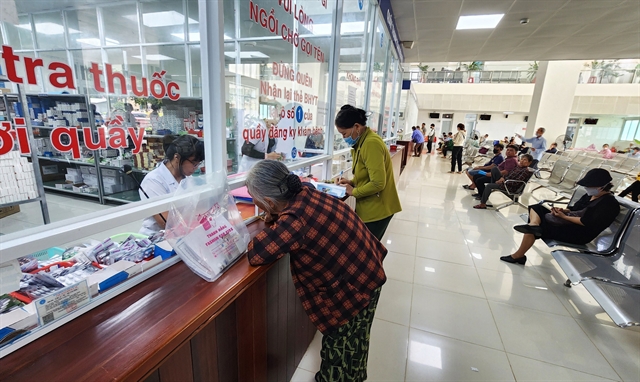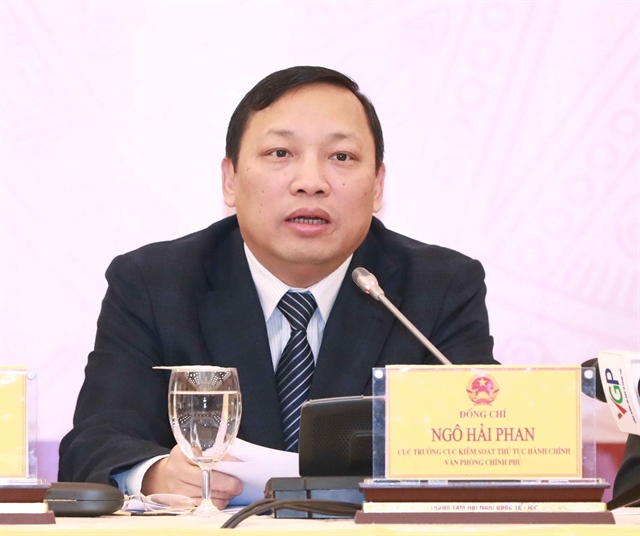 Opinion
Opinion


|
| Ngô Hải Phan, Director General of the Administrative Procedure Control Agency under the Việt Nam Government Office. — VNA/VNS Photo Doãn Tấn |
Ngô Hải Phan, Director General of the Việt Nam Government Office’s Administrative Procedure Control Department, speaks to chinhphu.vn about the Government’s resolve to improve the business environment and the country's competitiveness.
What are the key objectives of the Government’s Resolution No.68?
The Government Resolution No.68/NQ-CP on promulgating the Programme on the abolishment or simplification of business regulations in the 2020-25 period, issued on May 12, 2020, was developed based on experiences in other countries, particularly members of the Organisation of Economic Co-operation and Development (OECD).
The general objective of the 68th Resolution is to push for “a new wave in the third administrative and business reform” to bring national competitiveness in Việt Nam to a new level.
Key objectives include reducing the number of administrative business requirements that are considered unnecessary or simplify procedures in order to facilitate conditions for enterprises to operate.
The Resolution sets a target that by 2025, at least 20 per cent of business requirements or administrative procedures and at least 20 per cent of compliance costs will be slashed, moving towards to a transparent and low-compliance-costs environment to attract more domestic and foreign investment.
Will you please explain in detail about the Resolution No.68?
The Resolution is rather comprehensive and looks at five areas of business operations: administrative procedures, business requirements/conditions, reports, auditing and norms and standards.
The Resolution is not just effective against all existing policies but also against all planned policies and regulations to make sure that its targets are achieved.
The Resolution specifies that at least 20 per cent of compliance spending costs will be cut by 2025.
The Resolution No.68 also focuses on the implementation of one-stop-shop administrative procedures and online public service at both provincial and national levels.
What are the new points contained in the 68th Resolution?
The Resolution has three new core points as follows.
First is an administrative reform plan that is the most comprehensive thanks to an approach developed by OECD countries.
The reform scope of the Resolution No.68 is very systematic. All ministries and sectors are to review and calculate compliance costs to cut down unnecessary procedures or simply the procedures listed in all legal documents under their jurisdictions, and improve public service quality through the use of information technology to save time and expenses for the public and the businesses.
Thirdly, the Resolution also holds high the responsibility of the Ministry of Justice and line ministries in evaluating and assessing legal documents, the responsibility of the Government Office in implementing digitalisation of administrative services and coordination between concerned parties in reform efforts.
What about the implementation road map for the Resolution No.68?
According to the plan, the Government Office will develop statistics software for the implementation of the Resolution. That software must be available to submit to the Prime Minister before October 31 this year.
According to the schedule, from 2020-2025, all ministries and government offices will have to submit to the Prime Minister their proposed maps on how to implement the Resolution in two phases – the first one before May and the second before September 30.
Of course, their proposed maps must be drawn up with the help of Government agencies, enterprises and associations.
What is the role of unions, the enterprises themselves and the general public in the course of implementing the Resolution No.68?
Active response from enterprises and their unions as well as the general public will play a very important role in the course of implementing the Resolution.
A very important task laid out in the Resolution is gathering feedback from the general public, professional associations and enterprises about the challenges they are facing while implementing the Resolution. This is a foundation for the Government and the Prime Minister to come up with solutions to help enterprises and the people conduct business more easily.
We are confident that through consultations with enterprises and the people, we’ll be able to develop comprehensive software to enable all ministries, sectors, associations, enterprises and the general public to contribute their points of view on how to improve the country's business environment in general and the country’s institutional reform in particular. — VNS




